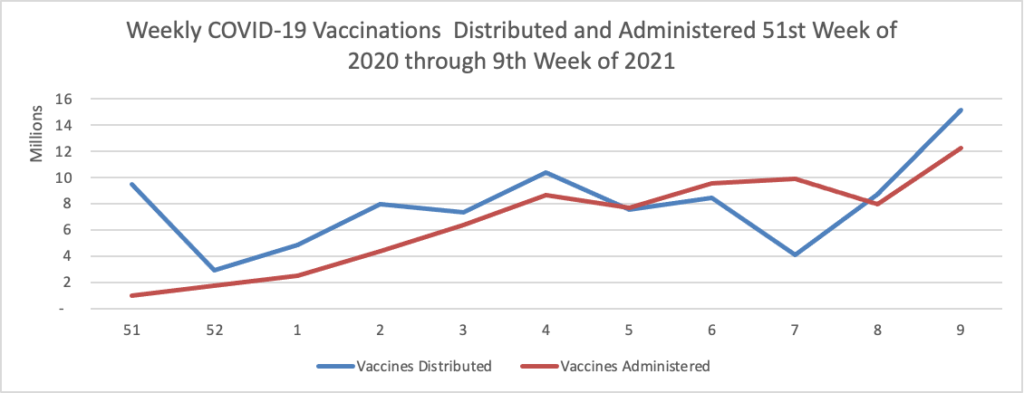Based on the Centers for Disease Control’s COVID-19 Data Tracker website, here is the FEHBlog’s chart of new weekly COVID-19 cases and deaths over the 14th week of 2020 through 9th week of this year (beginning April 2, 2020, and ending March 3, 2021; using Thursday as the first day of the week in order to facilitate this weekly update):

and here is the CDC’s latest overall weekly hospitalization rate chart for COVID-19:

The FEHBlog has noticed that the new cases and deaths chart shows a flat line for new weekly deaths because new cases greatly exceed new deaths. Accordingly here is a chart of new COVID-19 deaths over the period (April 2, 2020, through March 3, 2021):

Finally here is a COVID-19 vaccinations chart since mid-December 2020 which also uses Thursday as the first day of the week:

These are all encouraging charts. The CDC reports that as of today 21.7% of eligible Americans (over age 18) have received at least one dose of the COVID-19 vaccine and 11.2% of received two doses.
The CDC’s FluView continues to report that “Seasonal influenza activity in the United States remains lower than usual for this time of year.”
The Wall Street Journal informs us that
A new study on the topic in JAMA Cardiology is based on the screening of 789 professional athletes who tested positive for Covid-19 between May and October in Major League Baseball, Major League Soccer, the National Hockey League, National Football League, and the men’s and women’s National Basketball Association.
The paper shows that 0.6% of those athletes ultimately had findings suggestive of inflammatory heart disease. Five athletes were held out of competition because of their cardiac results. Three had myocarditis, which is heart inflammation, and two had pericarditis, which is swelling of the tissue that surrounds the heart. All had had moderate cases of Covid.
The findings suggest that long-term heart complications in non-severe Covid cases are unlikely—and that sports leagues are still likely to continue with cardiac screenings during the pandemic.
Govexec offers an interesting interview with National Institutes of Health Director Dr. Francis Collins.
